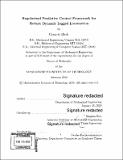Regularized predictive control framework for robust dynamic legged locomotion
Author(s)
Bledt, Gerardo.
Download1155112206-MIT.pdf (20.77Mb)
Alternative title
RPC framework for robust dynamic legged locomotion
Other Contributors
Massachusetts Institute of Technology. Department of Mechanical Engineering.
Advisor
Sangbae Kim.
Terms of use
Metadata
Show full item recordAbstract
Legged robots have the potential to be highly dynamic machines capable of outperforming humans and animals in executing locomotion tasks within dangerous and unstructured environments. Unfortunately, current control methods still lack the ability to move with the agility and robustness needed to traverse arbitrary terrains with the same grace and reliability as animals. This dissertation presents the successful implementation of a novel nonlinear optimization-based Regularized Predictive Control (RPC) framework that optimizes robot states, footstep locations, and ground reaction forces over a future prediction horizon. RPC exploits expertly designed and data-driven extracted heuristics by directly embedding them in the optimization through regularization in the cost function. Well-designed regularization should bias results towards a "good enough" heuristic solution by shaping the cost space favorably, while allowing the optimization to find a better result if it exists. However, designing meaningful regularized cost functions and adequate heuristics is challenging and not straightforward. A novel framework is presented for automatically extracting and designing new principled legged locomotion heuristics by fitting simple intuitive models to simulated and experimental data using RPC. Statistically correlated relationships between desired commands, robot states, and optimal control inputs are found by allowing the optimization to more exhaustively search the cost space during offline explorations when not subjected to real-time computation constraints. This method extracts simple, but powerful heuristics that can approximate complex dynamics and account for errors stemming from model simplifications or parameter uncertainty without the loss of physical intuition. Nonlinear optimization-based controllers have shown improved capabilities in simulation, but fall short when implemented on hardware systems that must adhere to real-time computation constraints and physical limits. Various methods and algorithms critical to the success of the robot were developed to overcome these challenges. The controller is verified experimentally using the MIT Cheetah 3 and Mini Cheetah robot platforms. Results demonstrate the ability of the robot to track dynamic velocity and turn rate commands with a variety of parametrized gaits, remain upright through large impulsive and sustained disturbances, and traverse highly irregular terrains. All of these behaviors are achieved with no modifications to the controller structure and with one set of gains signifying the generalized robustness of RPC. This work represents a step towards more robust dynamic locomotion capabilities for legged robots.
Description
Thesis: Ph. D., Massachusetts Institute of Technology, Department of Mechanical Engineering, 2020 Cataloged from PDF version of thesis. Includes bibliographical references (pages 153-160).
Date issued
2020Department
Massachusetts Institute of Technology. Department of Mechanical EngineeringPublisher
Massachusetts Institute of Technology
Keywords
Mechanical Engineering.